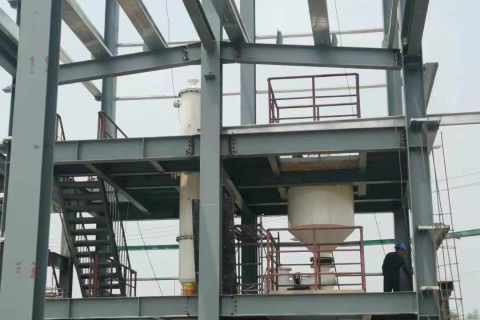
News
acetylene gas generator is an important equipment during the acetylene gas producting, the calcium carbide and water will react in the generator, and then the acetyhlene gas will be piped to the next equipment.
The function of this equipment is based on the principle of natural balance of adjacent adsorbent loads. In the drying stage, the adsorbent adsorbs water from the gas with high pressure flowing through the GZ-120/25 Molecular sieve high pressure acetylene gas dryer manual adsorber. During regeneration, a small amount of depressurized dry gas is replayed and regenerated through the adsorbent adsorbing water. Use the adsorption released by the gas in the drying process to heat the regeneration gas with reduced temperature after decompression, so as to improve the regeneration effect and reduce the regeneration consumption.
our small oxygen gas diaphragm compressor parameters for GD-85/35-300 are as below: inlet pressure 35bar, outlet pressure 300bar, flow 85Nm3/h and medium oxygen gas
small type Z diaphragm compressor is mainly used for laboratory, collecting various gases, and some of compressor are also installed in the container for compressing gases during movement.
Diaphragm compressors have multiple advantages, making them very popular in specific application fields. Here are some of the main advantages of diaphragm compressors: high gas purity, leakage prevention, quiet operation, low maintenance, high energy efficiency, high reliability and wear free compression.
acetylene gas is used with oxygen gas for cutting, in order to produce acetylene gas, our factory especially a set of simple production line to produce about98% purity acetylene gas to satify our customers' requirements
Cyclone dust separator HWCS 2 "is a device used for cleaning aqueous liquids containing dirt and solid particles, and can transport the cleaned liquid to sealed areas or other required areas. The design features of this device include standardized design, optional housing materials, and threaded connections that meet most commonly used connection requirements
The heat exchanger of mechanical seals is an important component used to cool the mechanical seal barrier/buffer/flushing fluid, which helps to reduce the temperature of the sealing surface, thereby optimizing sealing performance and lifespan.
A fluid reservoir for a pump mechanical seal is an essential component of the sealing system, particularly for double seal arrangements. It serves several important functions: Buffering: It provides a buffer for the process fluid, preventing it from coming into direct contact with the atmosphere, which can be critical in applications where the process fluid is hazardous or toxic. Pressure Control: The reservoir can help in maintaining a stable pressure within the seal chamber, which is crucial for the proper functioning of the mechanical seal. Lubrication: It can act as a source of lubrication for the seal faces, reducing friction and wear. Cooling: In some cases, the fluid reservoir can also serve to cool down the process fluid, preventing overheating of the seal faces. Flushing: It can provide a means for flushing the seal chamber with clean fluid, which is especially important in applications where the process fluid is abrasive or corrosive. Compensation for Thermal Expansion: The reservoir can compensate for any thermal expansion or contraction of the process fluid, maintaining the correct volume and pressure within the seal chamber.
selecting a hand refill pump for mechanical seals, it is important to consider the specific application requirements, including the type of fluid being handled, the operating conditions, and the necessary safety and reliability features to ensure the pump meets the needs of the system it will be used in.










